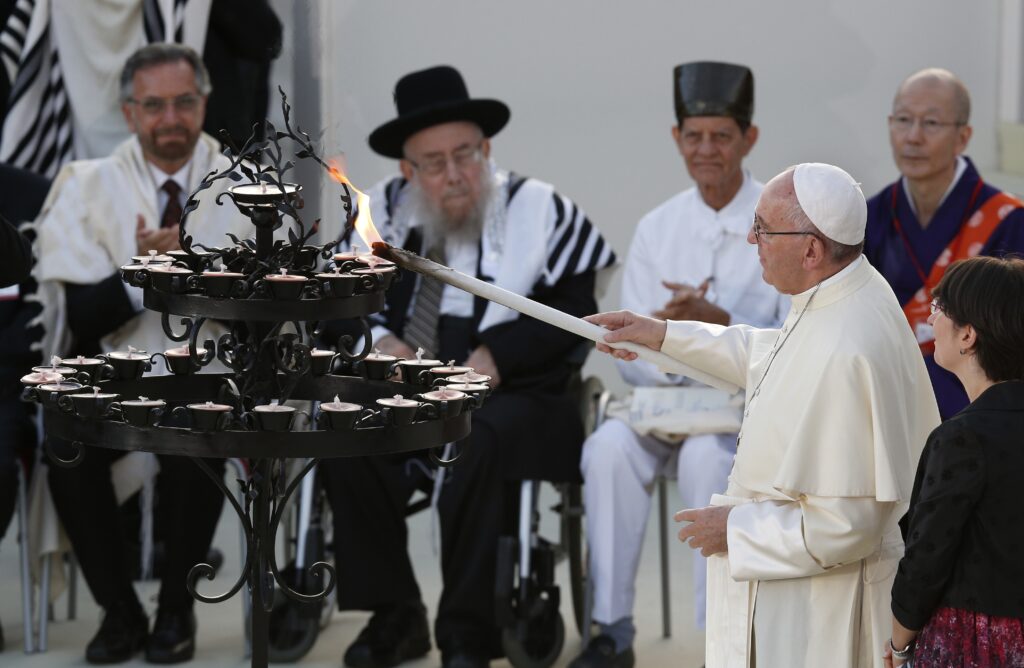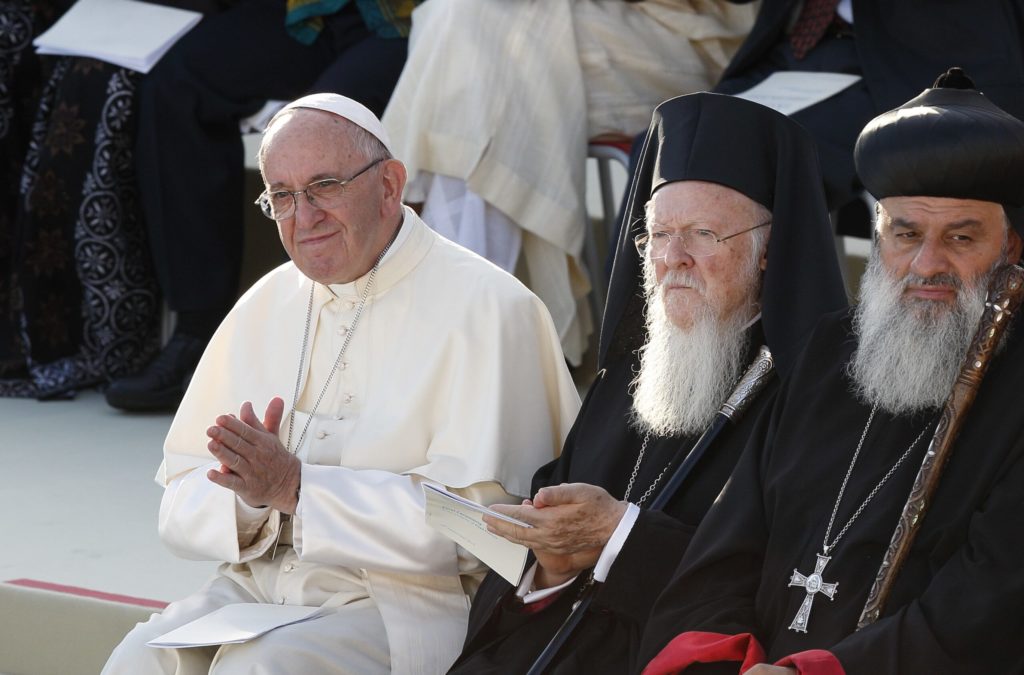On the occasion of the new Ecumenical Vademecum (".The bishop and Christian unity", published on December 4, 2020), intended for fostering Christian unity from local churches and individualsFirst, it is worth considering the importance of this task, which we call ecumenism. Secondly, we present the contents and most relevant aspects of the document.
Unity, a task for everyone
1. The council taught that the promotion of Christian unity is integrated in the great and unique "Mission". of the Church (to bring humanity to God) because Christ expressly willed it. Christ affirmed that, in the fulfillment of that Mission, he was Christian unity is a necessary condition, and so he prayed for her in his priestly prayer just before his passion: "May they all be one; as You, Father in me and I in You, may they be in us, for the world to believe that you have sent me". (Jn 17:21).
Therefore, the unity of Christians, which is gift of the Holy Spirit before it is our task, it has a model deep and supreme in the unity of the Trinity. And it has a purpose in history: "for the world to believe"The purpose of the mission. All Christians have a responsibility to spread the Gospeleach according to his or her own circumstances. Therefore, all of us must also participate in the ecumenical task, which is an important part of evangelization.
Prayer with faith
In addition to this fundamental motive, other motives can be adduced. These are the ones pointed out by John Paul II when he wrote about the prayer of Jesus. "The invocation that be one is, at the same time, an imperative that obliges us, a strength that sustains us and a salutary reproach for our idleness and narrowness of heart. The confidence of being able to achieve, even in history, the full and visible communion of all Christians rests on the prayer of Jesus, not on our abilities." (Letter Novo millennio ineunte, 2001, n. 48).
Previously, the holy Pope Wojtyla had stated that "the Church must breathe with its lungs."the western and the eastern (encyclical Ut unum sint, 25-V-1995).
In short, missionary (or evangelistic) commitment and ecumenical commitment go togetherThe fundamental witness that we Christians have to give in order to carry out our evangelizing mission is, above all today, that of our unit. This is why this unity is urgent and concerns all Christians. (Among other fundamental texts to orient oneself in matters of ecumenism, it is necessary to highlight: the decree Unitatis redintegratio, at 1964, of the Second Vatican Council; the Code of Canons of the Eastern Churches, 1990; the Directory for the application of the principles y rules about the ecumenism, of 1993; and the encyclical of John Paul II Ut unum sint 1995).
Continuity of the ecumenical task
2. This ecumenical vademecum is therefore in relation to the encyclical Ut unum sint, of John Paul II (1993). In it he confirmed the ecumenical commitment that the Catholic Church has acquired at Vatican II. irreversibly. On the occasion of the 25th anniversary of this encyclical, Pope Francis had already announced this "vademecum for bishops". in a letter to the Pontifical Council for Christian Unity on June 24 of this year.
This vademecum recalls the the duty and obligation of the bishops to promote Christian unity in their own Church. and also among all the baptized (since the bishop, as a member of the episcopal college, also participates in the "...").request for all Churches").
The document consists of an introduction and two parts.
The following aspects are highlighted in the introduction: the search for unity is essential to the nature of the Churchfaith that the other Christians have with the Catholic faithful a common royal communionThe conviction that the unity of Christians is a fundamental element in the vocation of the whole Church (it also concerns the local or particular Churches and, therefore, the bishops as visible principles of unity; the service it wishes to render to the local or particular Churches and, therefore, to the bishops as visible principles of unity. vademecumas a guide for the bishop in his role of discernment.
Promotion inside and outside the Church
– Supernatural first part shows the promotion of ecumenism within the Catholic Churchin its own life and structures, as a challenge first and foremost for Catholics. Bishops should promote dialogue with other Christians, orienting and directing ecumenical initiatives that take place within Catholic communities. To this end, they should organize ecumenical structures and take care of the ecumenical formation of all the faithful (laity, seminarians and clergy), as well as the media in relation to this topic.
The second part delves into the relations of the Catholic Church with other Christians. Explain the various modalities of the ecumenical task in this engagement with other Christian communities. It should be kept in mind that in practice much ecumenical activity will involve several of these modalities simultaneously.

Modalities of ecumenical activity
1) The "spiritual ecumenism"(based on prayer, conversion and holiness on the part of all).
He stresses the importance of the Holy Scriptures, the "purification of memory" (which St. Paul VI began at the time of the Second Vatican Council, and to which Francis has contributed in 2017 with the commemoration of the 500th anniversary of the Protestant Reformation) and the "ecumenism of blood" (because of the persecution and martyrdom of Christians).
2) The "dialogue of charity"based on human fraternity and, above all, on baptism. This is the framework of the "culture of encounter" promoted by Francis.
3) The "dialogue of truth"It is a dialogue that does not seek the lowest common denominator, but rather a dialogue that is not a dialogue of the lowest common denominator, but rather a dialogue of the common denominator. It is a dialogue that does not aim at the lowest common denominator, but rather at "shall be made with the acceptance of the whole truth." (encyclical Ut unum sint, 36). This dialogue takes the form of theological dialogue It requires "reception" (i.e., discernment and assimilation by Christian communities of authentically Christian teaching).
4) The "dialogue of life"In the field of evangelizing and pastoral mission, in service to the world and through culture, with patience and perseverance.
In this fourth context, three areas can be distinguished:
Pastoral, practical and cultural ecumenism
a) What is called the "pastoral ecumenism"that is, the promotion of Christian unity through pastoral ministry, in the missions, catechesis, sacramental life and liturgy, and the welcoming of those who wish to enter into full communion with the Catholic Church.
b) The "practical ecumenismThe "common service of Christians in the various fields of ethics and social justice, care for the most needy, care for life and the created world, etc., is emphasized. The common service of Christians is emphasized as a testimony of their faith and hopeThe aim is to promote an integral Christian vision of the dignity of the person.
It is also important to interreligious dialogue between Christians and other religious traditionswhose purpose is to cooperate and establish good relations with believers of different religions, although it is a different task from the ecumenical one. As already pointed out in the 1993 Ecumenical Directory, through this mutual ecumenical cooperation in dialogue with other religions, Christians can deepen the degree of communion that exists among themand can combat anti-Semitism, religious fanaticism and sectarianism.
c) The "cultural ecumenism"The aim is to promote understanding of each other's cultures and to promote the inculturation of the Gospel through concrete common cultural projects (academic, scientific or artistic).
Real dialogue
As has been said in recent days, ecumenism has a lot to do with the dialogue. For this reason, bishops must be people of dialogue, they must promote it as a method of evangelization and encourage the existence of spaces for dialogue at all levels. Certainly, the dialogue has been regarded as an icon of ecumenism. Dialogue does not replace the proclamation of faith, but is a way and a path that Jesus himself walked, to lead us to truth and fullness of life.
This vademecum offers guidelines and "practical recommendations" for the exercise of ecumenism in the local and particular Churches. It is a good opportunity to rekindle faith and prayer, commitment and responsibility of Christians in this area, which is so important for various reasons, as stated in the conclusion of the document, "death and resurrection from Christ mark the victory definitive from God about the sin y the division; the victory about the injustice y about all form from wickedness.".
Therefore, as Cardinal Ouellet rightly pointed out in the presentation, "a Catholic never tires of taking the first step towards rapprochement, because the charity that inhabits him obliges him to forgive, to share and to persevere in his commitment"..
You can also read a commentary to the new vademecum of the former apostolic exarch for the Catholics of the Byzantine rite in Greece, Father Nin.









